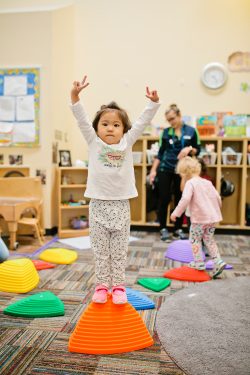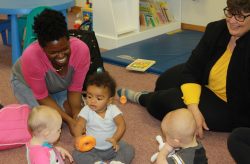The State of the Children Report Series: From Insight to Action
Jump to the State of the Children: Early Learning & Care Reports (Updated, May 2023)

The child care and early learning systems that so many Washington students and families rely on have been struggling to provide necessary resources and supports for communities across the state. In the face of 2020, and the crises that it brought, those systems face huge setbacks in building and rebuilding. Issues such as access, affordability, and availability of child care and early learning opportunities are often beyond the control of individual providers and educators, while families are forced to balance the needs of their children with the need to stay in the workforce. Businesses are also grappling with the adverse effects of our strained child care and early learning systems, including the seen and unseen costs that affect business operations, employee retention, and more. The fact is Washington’s early learning and child care systems need help.
With so many moving parts, and so many families, children, and businesses affected, a big question stands out – how can we begin to repair these systems? Washington STEM is looking for answers in the data, which can help pinpoint broad and acute problems and let us know which families are grappling with those problems most.
In 2019, Washington STEM began to hear from our partners that while much of their work engaging historically underserved students had been successful, access and opportunity to high-quality early learning experiences remained a serious issue. This lack of access was one of the first big barriers that was brought to our attention. We began to hear more and more of this feedback from Washington Communities for Children (WCFC), Child Care of Aware of Washington, the Washington Department of Children Youth and Families (DCYF), and our regional STEM Network partners. At this point, we decided to explore whether Washington STEM could put its skills in service to be a part of the solution.

As we continued to listen and learn from those impacted by the lack of supports in our early learning and child care systems, partners across the state began to ask us, “Can you help pull together the data that could help us devise better solutions, and help tell the story of what those data say?” It was at that point that the idea of the State of the Children: Early Learning and Care report series came to life. This report series takes a region-by-region look at key data points that illustrate the shared challenges and opportunities Washington’s early learning and child care systems face.
Once we committed ourselves to bringing early learning and child care data to life, we knew that we couldn’t do it alone. Washington Communities for Children (WCFC), a statewide network comprised of regional coalitions that span all of Washington, became a natural partner in this work. WCFC had previously created reports for the Northwest and Southwest regions, which allowed Washington STEM to align and scale the reports across all regions, while applying our communications and data expertise to strengthen the overall quality. WCFC also provided essential on-the-ground insight that comes from their regional coalitions. That community voice was critical in ensuring that, as we collected and aggregated data, the lived experiences communities grapple with would also be represented in the State of the Children reports.

Over the past 12 months, Washington STEM and WCFC have been working hand-in-hand to co-create the first ever State of the Children reports. In order to ensure that this work was not only high quality, but accessible and useful, we created a collaborative design process that would allow for the community input that WCFC brings, while applying the data and storytelling expertise of Washington STEM, to create something truly unique.
The information and data in this series further illuminate the disparities among communities across Washington when it comes to early learning and child care. In this report series, readers will learn more about the availability of child care in various geographies of the state, capacity of existing child care providers, compensation of child care teachers, and the economic impact on employers of a child care system in crisis. We believe the data, information, and stories in this report series will be a powerful resource in developing the strategies necessary to strengthen Washington’s early learning and child care systems. This report series may be complete, but our work is far from over. Washington’s children and families are counting on all of us.
State of the Children reports by region: (Updated, May 2023)
- Inland Northwest Region WA – State of the Children: Early Learning and Care (En Español)
- King County, WA – State of the Children: Early Learning and Care (En Español)
- North Central Region WA – State of the Children: Early Learning and Care (En Español)
- North Olympic Region WA – State of the Children: Early Learning and Care (En Español)
- Northwest Region WA – State of the Children: Early Learning and Care (En Español)
- Pacific Mountain Region WA – State of the Children: Early Learning and Care (En Español)
- Pierce County, WA – State of the Children: Early Learning and Care (En Español)
- South Central Region WA – State of the Children: Early Learning and Care (En Español)
- Southeast Region WA – State of the Children: Early Learning and Care (En Español)
- Southwest Region WA – State of the Children: Early Learning and Care (En Español)
Additional early learning and child care resources:
- Analysis: Washington State Early Learning & Care: Where Historic Underinvestment Meets National Health Crisis
- Organization: Washington Communities for Children
- Organization: Child Care Aware of Washington
- State Agency: Washington Department of Children, Youth, and Families
- Report: Association of Washington Business – The Mounting Costs of Child Care